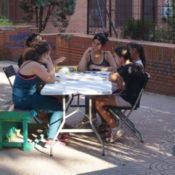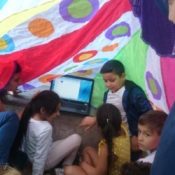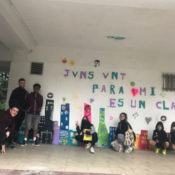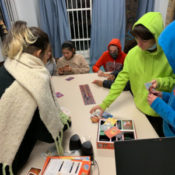“Once we’ve seen injustice, we have to do something about it.”
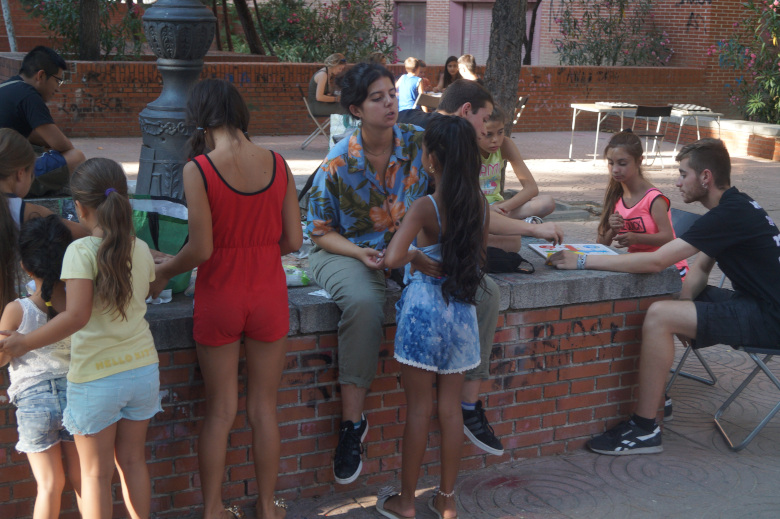
Photo: The San Isidro Knowledge Festival, Madrid. © ATD Fourth World Spain
There are many different ways to be involved in ATD Fourth World. For full-time Volunteer Corps members, strengthening ties with people living in poverty is a priority. In all projects, ATD constantly seeks to learn with and from disadvantaged communities. ATD’s goal is building a more peaceful and just society that respects the dignity of all people and the environment.
This article is part of a series illustrating different individuals’ experiences as they learn about life and work with the ATD Volunteer Corps. If you want to help eradicate extreme poverty and would like to learn more about joining the Volunteer Corps click here.
Virginia Pintó Muñoz reflects on her work as a ATD Volunteer Corps member in Madrid.
How did you first discover ATD Fourth World in Spain?
I discovered ATD Fourth World through a Festival of Learning in the San Isidro neighbourhood of Madrid. It was a very long summer when I was finishing high school and studying for my Baccalaureate.
At the time, I was looking for volunteer opportunities where I could get to know people whose life was different from my own. I wanted to learn in different ways than I had before.
ATD Fourth World taught me new ways of understanding poverty. I discovered that extreme poverty exists in our cities. In my work, I saw first hand what people have to struggle with every day. All this completely changed me as a person.
The Festival of Learning was a real and safe place for me. The people involved all did it out of love and positivity. Everyone contributed something, from local youth to activity facilitators. And that destroyed the image I had of NGOs and what it was like to work with children. It also made me want to know more of course.
What made you want to get more involved?
ATD Fourth World’s way of understanding people and our relationships with them. An ATD member with a few girls from a stigmatized neighbourhood for a few weeks in summer can do a lot and a great number of associations everywhere do this. But making the activities meaningful, finding ways for families in poverty to truly participate in activities, inviting and listening to each girl, seeking her out, understanding the reason a mother is frustrated, the reason a child is afraid to express herself, or why San Isidro was an important neighbourhood in it of itself – all these things made me stay.
Afterwards, I also joined the Street Library that was taking place in that same neighbourhood. That allowed me to get much more involved with ATD and I became more committed to the work they were doing. Helping with the Street Library made me understand the importance of consistency and being close to people for our relationship with the neighbourhood and its residents.
Hearing the voices and experiences of people we met made me want to do more. This has never left me and it’s something I still feel strongly about today.
What kind of activities did you do as you were learning about ATD Fourth World?
Starting to work with ATD Fourth World, at least in Madrid, involves being part of a team of other members of the Volunteer Corps. In addition to being part of weekly team meetings, I I also worked on several other activities.
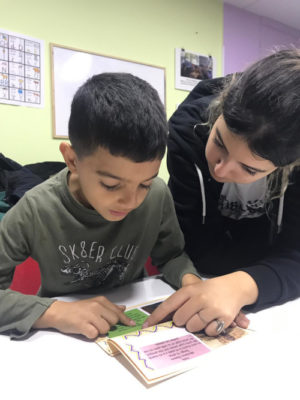 Since I began two and a half years ago, I’ve worked with the Festival of Knowledge and the Street Library in San Isidro. I’m also one of the organisers of the Tapori Group that began there when the Street Libraries ended.
Since I began two and a half years ago, I’ve worked with the Festival of Knowledge and the Street Library in San Isidro. I’m also one of the organisers of the Tapori Group that began there when the Street Libraries ended.
I’ve also been part of our process of looking for new places to work, where we’re getting acquainted with other Madrid neighbourhoods known for severe poverty.
I’m also a member of our communications team. We manage social media and our website. And we publish Echoes of the Fourth World, a small newspaper with information on special events and important issues concerning ATD Fourth World in Madrid.
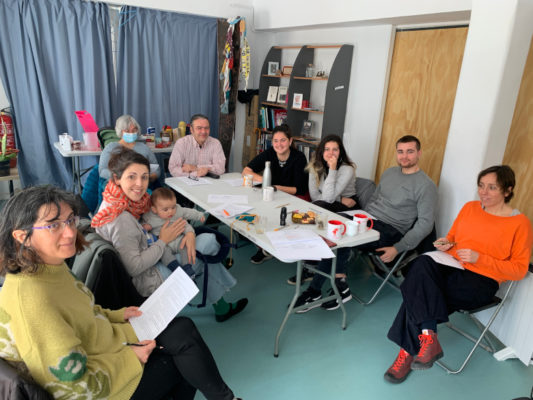
From this team, I’ve learned a lot about how we communicate about both poverty and the struggles and sacrifices of those who experience it. I’ve learned how to communicate in a positive, constructive way that doesn’t victimize people or take advantage of them.
I’ve also been a part of the weekly Encuentro Group, a comfortable place where people can just chat and learn from one another’s life experiences. Then I’ve also helped with summer Tapori Camps, gone on vacations with families, and worked with the training team. During the lockdowns, I helped with our school mentoring work, something we’ve continued to do since then.
I am also part of the People’s University, which will take place on October 17 (World Day for Overcoming Extreme Poverty) and the Merging Knowledge work that is going on in Madrid right now.
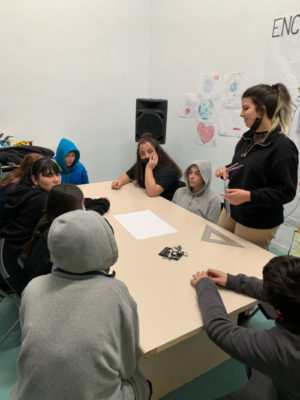 The thing I like best and where I’ve put the most energy since I started in 2019 is the youth group. I continue to learn so much from that every day. It has evolved a lot, through ups and downs, new additions and departures. The great times we’ve shared have really had a lasting impact on me.
The thing I like best and where I’ve put the most energy since I started in 2019 is the youth group. I continue to learn so much from that every day. It has evolved a lot, through ups and downs, new additions and departures. The great times we’ve shared have really had a lasting impact on me.
This group of teenagers teaches me every week that we should never settle that we will never know all there is to know. They’ve shown me that every day we have so much to listen to and think through with other people.
What aspects of poverty have become clearer to you during your work? What have you learned?
I’ve discovered the shame, which is passed down from generation to generation. Because of shame, people choose to live in the shadows because they have a deep fear of being singled out. This terror makes the discrimination they experience even worse.
I’ve learned how important it is to recognize and value what people with an experience of poverty have to say. I’ve come to see the potential power of empathy and words as armaments.
I have also learned that people in poverty have to struggle every day. I know now how hard is it to get up every day in a society that keeps pushing you away and blaming you for your own poverty and isolation.
But what I have learned most of all is that each person has inside themselves the power to change things from wherever they are. But it is very important to start with what people who are experiencing that injustice themselves have to say.
In other words, all of this injustice shouldn’t paralyse us. Even small victories can be huge when society just expects you to fail.
Are there any special memories you could tell us about?
There is one memory that I’ll always treasure. It’s something that gives me strength when I feel like things aren’t going well or when I’m overwhelmed with frustration. It was the day that the Youth Group went to the [ATD Fourth World] International Center in Méry-sur-Oise (France). Of all the time I’ve spent with ATD, that day has been one of the most important day for me.
It was last summer and we’d gone to France to meet the Noisy-le-Grand Youth Group. We all went to visit the International Centre as a sort of farewell before going home. It was the first time any of us, including me, had ever been there and something about it just clicked.
I can’t really explain how it felt to arrive in a place you don’t know but then somehow to feel like it is yours, like it’s where you’re supposed to be.
For the young people, it was a very profound experience to meet so many people from different parts of the world who shared the same struggle that their own families had. At the International Center, we found photos of activists from Madrid describing their own neighbourhoods with deep affection. People at the International Center told the young people in our group, “Your mother is an example for everything we are working for. You should be very proud.”
The young people in our group got to explore all the hidden corners there and listen to stories the International Center had to tell. In these stories, they saw their own experiences reflected back to them. It was a powerful time for these teenagers. They really recognized themselves as part of a movement so much bigger than Madrid. It was one of the most powerful things I’ve ever experienced and it was a real turning point in my life.
What do you see as your role in ATD Fourth World
I want to be very clear that my role is to learn. I have come to be a bit like a sponge, absorbing everything that the people I meet have to teach me. This is something that I’ve had to learn. We don’t always know how to really listen and let ourselves be affected by empathy. Above all, it can be difficult to cast off those judgmental opinions that we’ve had instilled in us since we were little. Yet these opinions can cause so much harm.
I know that in this kind of work, encountering poverty face-to-face can be very painful. Especially when you really understand what other people are living with. But you have to stay motivated and keep going. That’s one of the strength’s of ATD Fourth World. Once we’ve seen injustice, we don’t stand still. We have to do something about it.
- For me, learning about this movement has meant being open to building something together, supporting other people in things they are going through. And it means learning with people who are struggling against poverty and its stigma every day.
Does the ATD Fourth World movement change people’s lives? How has it changed you personally?
If I didn’t believe that ATD Fourth World changed people’s lives, I wouldn’t be here right now.
In the last five years that I’ve been working on different ATD activities, I’ve become an agent of change. And, more important, I have helped other people become agents of change too.
In my opinion one of the most revolutionary things about this movement is that each person counts. And we have to make every effort so that everyone’s participation in things is as effective as possible. That changes people’s lives precisely because they themselves are the ones who get to bring about change. It is invaluable.
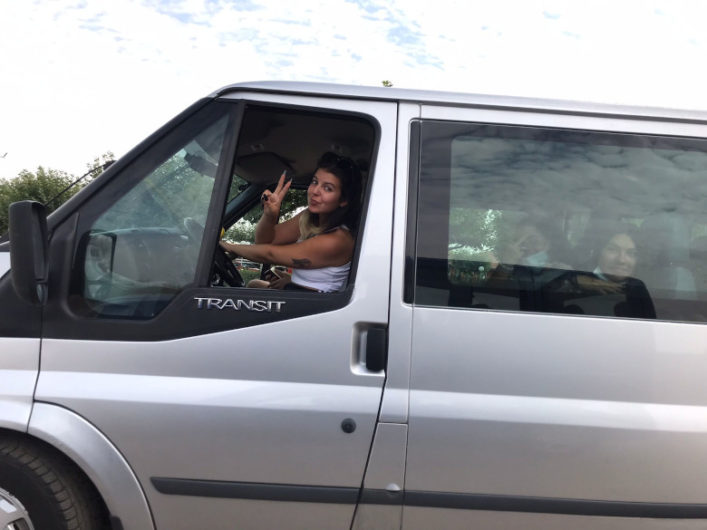
Now, wherever I go I always keep in mind the lives of people in poverty and their struggle. Now, I carry that struggle as a part of who I am.


